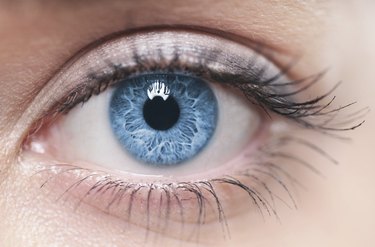
Melanin is the natural substance that gives color or pigment to the skin, hair and iris of the eye. Cells called melanocytes, located just below the outer surface of the skin, produce melanin, which is in higher levels in people with darker skin. Melanin's primary function is to protect the skin from sun damage, but it carries additional benefits that are enjoyed mostly by those with darker skin.
Protective Function
Video of the Day
Exposure to the sun has the potential to cause premature aging of the skin, as well as various skin cancers. These range in severity from basal cell carcinoma to melanoma, an aggressive cancer that spreads more rapidly than milder skin cancers. Your ability to withstand the potentially damaging effects of the sun's ultraviolet radiation depends on the amount of melanin in your skin, which is determined by the number of melanocytes that are active beneath the surface of your skin. In even the most light-skinned people, the body's melanocytes respond to sun exposure by producing more melanin, which creates the effect known as tanning. However, there is a limit to the degree of protection that melanin can provide, and it's significantly higher in people with naturally darker skin.
Video of the Day
In "Dark Deception: Discover the Truths About the Benefits of Sunlight Exposure," author Joseph Mercola suggests that skin color is a reflection of the geographical area from which your ancestors originated. Thus, descendants of people who traditionally lived in tropical regions with high levels of sun exposure tend to have darker skin, and those whose roots are traceable to ancestors from cooler, northern climes are generally fairer in color.
Younger-Looking Skin
Dermatologist Susan C. Taylor, author of "Brown Skin," points out that African-Americans and other people of color generally look younger than their lighter-skinned peers because of the higher levels of melanin in their skin. The increased melanin protects those who have it from short-term damage from the sun, as well as the long-term signs of aging, such as age spots, deep wrinkles and rough texture, according to Taylor.
Targets Free Radicals
Free radicals have been implicated as the cause of widespread damage to human cells. In an article written for The Sun and Your Skin website, Diana Clarke, the website's founder, writes about melanin's role in scavenging free radicals, preventing the skin damage they can cause. To explain how melanin fights free-radical damage, Clarke quotes Sergio Nacht, a principal in the skin care consulting firm of Riley-Nacht LLC: "It affects the delicately designed lipids that hold moisture in the stratum corneum." This is the outermost layer of the epidermis. "If the skin loses its moisture, it becomes rigid and cracks."
Some Drawbacks
Although increased melanin levels have many benefits for people with naturally darker skin, having more melanin has a few disadvantages. In "Brown Skin," Dr. Taylor says that having more melanin tends to make the skin of African-Americans and other people of color more reactive. She writes: "That means almost any stimulus -- a rash, scratch, pimple or inflammation -- may trigger the production of excess melanin, resulting in dark marks or patches on the skin."